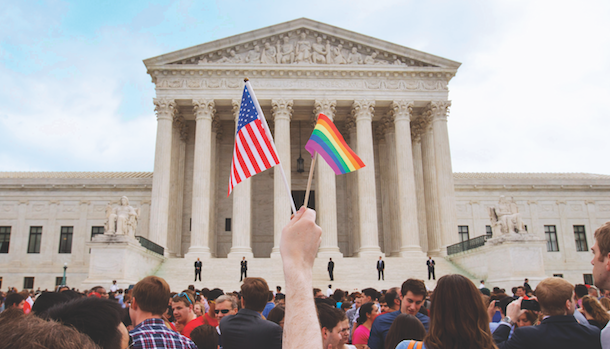
LGBTQ Groups Call on Senate to Reject ‘Far-Right Extremist’ Brett Kavanaugh
Advocates say Trump's Supreme Court pick poses grave threat to equality.
President Trump on Monday night nominated to the U.S. Supreme Court a judge who has no known LGBTQ-related decisions in his 12 years on the federal appeals court. But LGBTQ activists feel certain that Judge Brett Kavanaugh will be no Justice Anthony Kennedy.
Rea Carey, head of the LGBTQ Task Force, said “There hasn’t been a nominee for the Supreme Court this extreme since Robert Bork.”
Jenny Pizer of Lambda Legal was more blunt, saying Kavanaugh will “yank the court sharply to the extreme right.”
Equality California called him a “far-right extremist.”
Shannon Minter of the National Center for Lesbian Rights said there is nothing in Kavanaugh’s record to indicate he “understands the real-world impact of discrimination on LGBT people or the importance of construing our nation’s laws to enable them to participate fully and equally in society.”
But Kavanaugh, speaking from prepared remarks in the East Room of the White House Monday night, tried with whatever he could find to suggest he understands.
He said he was deeply honored to fill Kennedy’s seat. He didn’t mention that Kennedy had, during his time on the bench, become a reliable swing vote in favor of equal rights for LGBT people in four landmark cases.
Kavanaugh noted that Justice Elena Kagan, when she was dean at Harvard Law school, hired him to teach students there that “the Constitution’s separation of powers protects individual liberty….” He did not mention that Kagan has been a reliable vote for LGBT equality, too.
And Kavanaugh credited his mother, a judge who had once taught in public high school. He said she “taught me the importance of equality for all Americans.”
Kavanaugh, 53, did not mention that he also clerked for Ninth Circuit Judge Alex Kozinski. Kozinski, who resigned last year as allegations surfaced that he engaged in sexual misconduct. Kozinski was also a supporter of equal rights for LGBT people.
President George W. Bush appointed Kavanaugh to the D.C. Circuit of the U.S. Court of Appeals. Prior to that, Kavanaugh worked in the White House as President Bush’s Staff Secretary and he married the woman who worked as Bush’s personal secretary. In the Bush White House, Kavanaugh was a key player in choosing U.S. Supreme Court nominees, most of whom were very right-wing.
At Kavanaugh’s own confirmation hearing in 2006, then Senator Sam Brownback (R-Kan.) told Kavanaugh that the issue of same-sex marriage was coming up through the court system. He asked, “Do you have a viewpoint on issues, say, as marriage and the determination of the definition of that? Is that something that the court should establish or is it left to the legislative bodies?”
Kavanaugh said he was hesitant to discuss the issue, since it might come before him on the D.C. Circuit.
“In terms of your general principle about judicial activism,” said Kavanaugh, “I do think that some of the worst moments in the Supreme Court’s history have been moments of judicial activism, like the Dred Scottcase, like the Lochnercase, where the Court went outside its proper bounds, in my judgment, in interpreting clauses of the Constitution to impose its own policy views and to supplant the proper role of the legislative branch. So I think, in terms of judicial activism, that is something that all judges have to guard against. That is something that the Supreme Court has to guard against. And throughout our history, we have seen that some of the worst moments in the Supreme Court history have been moments of judicial activism where courts have imposed their own policy preferences.”
Rachel B. Tiven, Chief Executive Officer of Lambda Legal, said LGBTQ people “have good reason to fear that Judge Kavanaugh will abuse his power on the Court to protect the wealthy and the powerful while depriving LGBT Americans of our dignity, demeaning our community, and diminishing our status as equal citizens.”
Chad Griffin, president of the Human Rights Campaign, said Trump “followed through on his threat to nominate a justice who would undermine LGBTQ equality, women’s reproductive rights and affordable healthcare.”
“This nominee was hand-picked by anti-LGBTQ, anti-choice groups in an explicit effort to undermine equality — and the prospect of a Justice Kavanaugh threatens to erode our nation’s civil rights laws, block transgender troops from bravely serving this nation and allow a license to discriminate against LGBTQ people in every aspect of American life,” Griffin said. “The 2018 midterm elections just became the most consequential elections of our lifetime, and we must seize the opportunity to pull the emergency brake on this regime. We need to vote this November like our lives depend on it—because they do.”
The Transgender Law Center also called on the Senate to reject Kavanaugh, calling him “a divisive, radical conservative whose appointment would pose a devastating threat to the rights and well-being of transgender people nationwide.”
Many political observers are speculating that Trump was drawn to Kavanaugh in no small part because he thinks Kavanaugh would protect him when certain issues come before the Supreme Court. Kavanaugh has written, for instance, that he does not believe a U.S. president can be criminally indicted or subjected to a civil lawsuit while in office. U.S. Senator Cory Booker, D-New Jersey, who is on the Senate Judiciary Committee, told The Rachel Maddow Show that the Kavanaugh nomination was Trump’s “get out of jail free card.”










